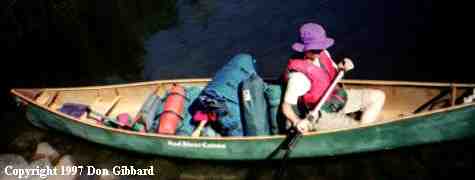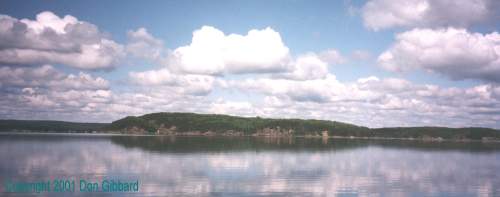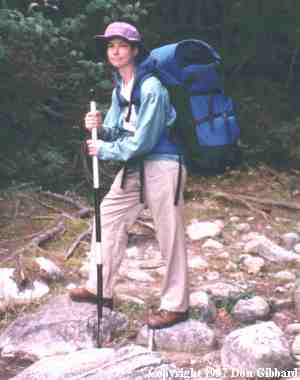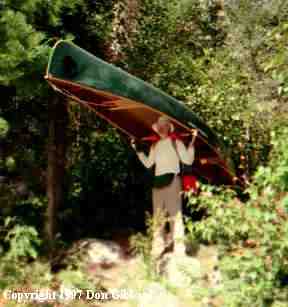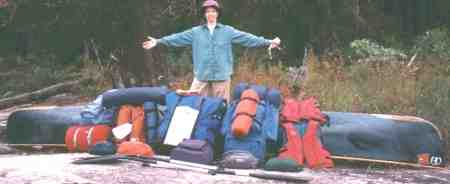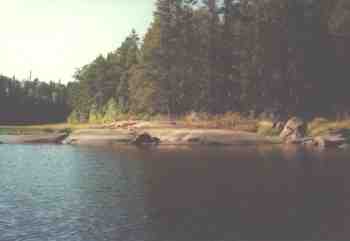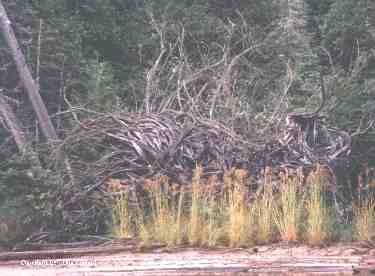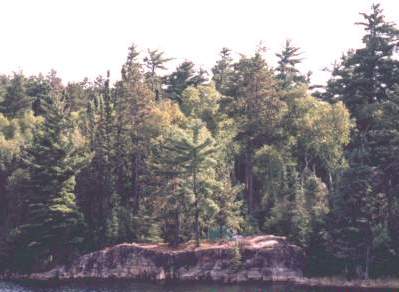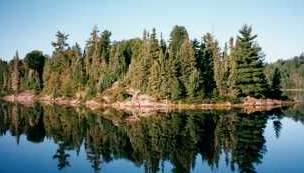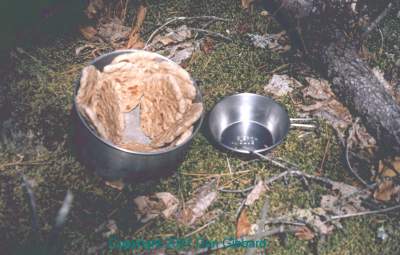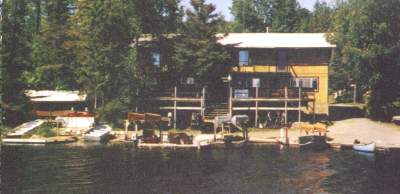
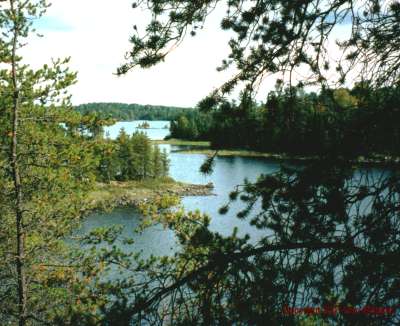
|
25-Day Canoe Trip From Cache Bay To Cache Bay
This canoe trip started and ended at the end of Gunflint Trail. We had a wonderful 25-day trip. The weather played a big part in that - it was excellent. There were only 5 or 6 days that it rained at all, one of which was the first night, which ended the fire ban that had been on for several weeks.
We traveled camp-to-camp 15 days and had 11 layover days. The longest we stayed in any one camp was three nights. The weather was always good enough to travel - we traveled when we wanted and rested when we wanted. We were never held up because of strong winds or rain. A typical travel day would be: Get up at 5:30 or 6:00. Peg packs up sleeping bags, tent and tarp while Don retrieves the food and prepares breakfast. Breakfast is typically oatmeal with coffee or tea, although we did have pancakes and some no-cook breakfasts a couple of times. Don cooks on a small backpacker camp stove. We eat and clean up and at 8 or 9 we are ready to go and put everything in the canoe. We canoe through lakes, small and large, and carry the gear and canoe from one lake to another. The longest carry we did on this trip was under a half mile. Usually we would find a campsite by 3 pm. Sometimes they were sites that were heavily used, sometimes we make our own - clearing out some fallen trees, adding pine needles to fill-in holes.
Once in camp if the weather was warm enough, we would take a quick swim to clean up and rinse out some clothes. Then camp chores started. Don would hang ropes to hang the food. (This was no small task, and often took over an hour. I estimate we had over 80 pounds of food when we started the trip. It was crucial that this task be done well, too, as we did not want to lose our food to a bear and have to end our trip early.) Then Don would prepare dinner. Peg would set up the tent, remove food and necessary gear from the packs, wrap other gear in a tarp to keep dry and critters out, and purify water. If we thought there might be rain we'd set up a tarp so there'd be a dry spot to cook in in the morning. We'd eat dinner at about 6, clean up, hang the food (every last bit, even soap and toothpaste), and relax for the last 30 or 60 minutes before dark. Most nights we were asleep by 8:30, and then started all over again the next day.
Some layover days weren't that different
- we'd travel some where and come back to the same
camp. The only difference was we didn't have to set up food ropes and
the tent. Other layover days we stayed in camp and did chores, read, or
watched the clouds go by.
All of our belongings were carried in a large Duluth pack, one of two internal frame packs, one of two day packs, or one of two fanny packs. We each also always carry another fanny pack with emergency supplies (emergency blanket, band aides, flashlight, etc). The Mad River Explorer - Kevlar canoe weighed about 55 pounds, and in the beginning of the trip the three big packs weighed 50-60 pounds, the day packs about 35. Note: We rented our favorite canoe, the Mad River Explorer - Kevlar, from Beartrack Outfitters (www.bear-track.com) in Grand Marais, MN (Phone 800-795-8068). We have rented this kind of canoe from them on two different trips and have been real pleased with their competent and friendly service.
Our first four days of travel followed a path we'd taken six years ago, so it was somewhat familiar. Things went well - in the beginning we had to make three trips for each portage because we had so much stuff, but we were more organized than the previous trip and were able to travel just as far each day.
In the middle of the trip, we must have needed additional character building. On day 12 we got a good early start. Even though we had some heavy fog and rain in the morning, we had completed 4 of our 6 portages for the day before noon. Unfortunately, the last two portages were the longest ones, and we had some difficulty locating both of them. At the beginning of the trip, the ranger had gone over our maps with us and corrected most of the portages that needed it, but there were still some inaccuracies, and some of the portages are just plain hard to locate. After we located the sixth portage behind some windfall, we backed up for a photo of a fallen tree with some rushes in front of it.
Don took the photo of a cedar tree's root ball with some rushes growing in front of it. After the photo, we went back to the portage and got to work. We knew this portage was about half a mile and that there was a lot of elevation change to it and a marsh in the middle. We went up the hill, cursing the portage crew that had not cut through a number of trees that had fallen across the path. One was at a height that was too high to step over but too low to duck under with a pack or canoe, so we had to take packs off on one side and push them over, an d put them back on the other side. We walked along the marsh, keeping it on our right, not walking through it on another path we saw, as the map showed. Then we walked to down the hill to our destination, Grey Lake. We selected to travel to Grey Lake because on a previous trip it seemed to be off the beaten path - we didn't see anyone for three days when we traveled to and from it.. Pretty well exhausted, we prepared to take off for our campsite. We looked out and saw some one coming into the lake on a different portage and another one paddling through the lake towards that portage. We were astonished. We just couldn't image how this lake could become so popular -- must be good fishing. I looked at the map to see where that portage was coming from, but didn't see it. I also couldn't find the island that should have been right in front of us. I pulled out my compass and found we were facing south, not north like we should have been. I rechecked the map to see what lake we could have mistakenly portaged to, but could not figure it out. Don said, let's just put the stuff in the canoe and get out there and see where we are. We paddled out a few yards and looked around. Then Don laughed and laughed. "What do you see? What do you see?" he asked. It was the fallen cedar tree with rushes in front of it. We had gone in a circle. Some how we had gotten on an old portage (not maintained by the portage crews...) going up the hill and instead of crossing the marsh in the middle, we had come down the new half of the portage to the same lake. After a break for some snacks to lift our spirits, somehow we got the energy to haul all the stuff back UP the hill and ACROSS the marsh and down the hill, and found the primitive campsite at Grey Lake where we had camped six years ago.
The next day we overheated our trusty Svea camp stove and had a flame burning out of the stove's safety valve. We were afraid that we were going to have to cook over a fire for the rest of the trip. We were not prepared for that -- we had a small saw, but didn't have an ax or a grate to set the pans on. We were afraid that we would have to end the trip when our no-cook food (mainly crackers and peanut butter) ran out. But we did finally work out a way to use the stove safely. The third incident happened later that day when one of the food bags fell about 8 feet as Don was trying to hang it up. Nothing was damaged or lost, but this had never happened before and got our attention. Those were our three bad lucks. After that everything went just great again. (Side Note: Our Svea stove never quite recovered from the safety valve blowout. The safety valve became much more sensitive and now releases at an inconvenient lower temperature.)
A lot of people are surprised that we don't fish on these trips. We don't know much about fishing or about cooking them. There are some lakes though where you don't have to know anything about catching fish to be successful. Peg's scariest moment happened on the trip was she was down at Glacier Lake water's edge purifying water. This is typically a peaceful half hour of sitting on a rock as close to the water as possible, pumping with one arm until it gets tired, then switching to the other, looking down in the water or out in the sky. The previous day Peg had watched a bald eagle from that location. Water is brought to the purifier through a plastic tube that is weighted down on the bottom end with some metal to keep it below the water's surface. It typically floats out about 6 to 12 inches from the rock she sits on. She had finished pumping about 3 liters of water when all of a sudden there was a huge splashing and commotion right in front of her on the rock and something was trying to take away the purifier. A fish had come in and tried to eat the tube of the purifier! After she settled down, she realized that it was probably a 12 or 14 inch pike that took that metal as bait. It was too bad she didn't have a hook on that thing or she'd have caught some dinner. When she cleaned up the purifier before packing it away, she noticed the end of the tubing had been sliced - those fish have some sharp teeth!
We had lots of other littler adventures and plenty of great scenery, fresh air, and sleep. After a week or two, we finally got into the rhythm of being there. We knew where things were in our packs, what we needed to do and how to do it. Most of our time was taken up with fulfilling our basic needs, making our bodies work, and allowing our minds to rest. The important things were what we thought about - what's for dinner? do we have an adequate shelter and water? That's about it. What more is there, really? Don's Addendum:
25 days in a fairly remote area was time enough for both of us to change our cultural awareness. We both came back with a different perspective on our lives. Immediately upon our return, the difference was quite sharp, but it has faded over time. Our constant routine for 25 days had been to spend almost all of our time taking care of our basic necessities and it was most satisfying. Our extended vacation from our "normal daily routine" was long enough to significantly reduce our familiarity with it. Upon return, our daily activities weren't as familiar to us as they used to be. Subconscious activities rose to a conscious level and we developed a greater awareness of non-essential activities and "things" (i.e. clutter) in our lives. We still settled back in to our routine, but it was with a new kind of awareness. Some of our awareness was a disappointment to us. We'd think about wasting our time and resources on many different things. But, some of our new found awareness delighted us. Just to turn on a water tap and get a virtually unlimited supply of water at any temperature we wanted! Or going into a restaurant (like the Angry Trout in Grand Marais) and having a wonderfully prepared meal served to us while we just sit in a comfortable chair on the dock enjoying the lake view. Or retiring to a warm cabin at night, sleeping in a comfortable bed, and not worrying a wit about the weather. It's also good to be back. We were extremely fortunate to have this wonderful extended wilderness trip - especially with such nice weather. To date, it has been our best trip ever. I expect it will be difficult to top this one, but we're always willing to give it a try! 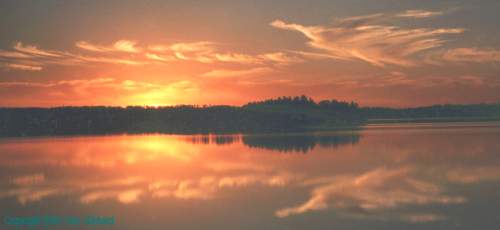 Cache Bay Sunset |
